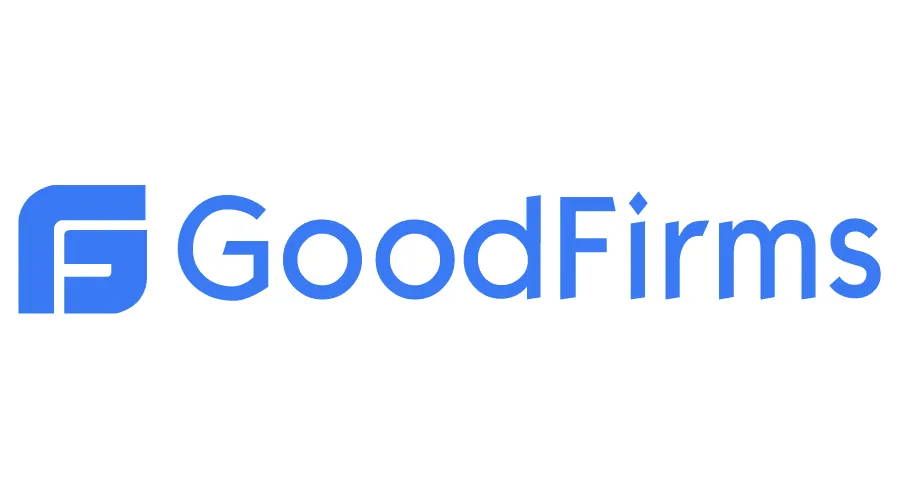- Services
- Case Studies
- Technologies
- NextJs development
- Flutter development
- NodeJs development
- ReactJs development
- About
- Contact
- Tools
- Blogs
- FAQ
Building Custom Validation Rules with Zod in Node.js
Discover type-safe validation patterns, async validation, and best practices for data validation.
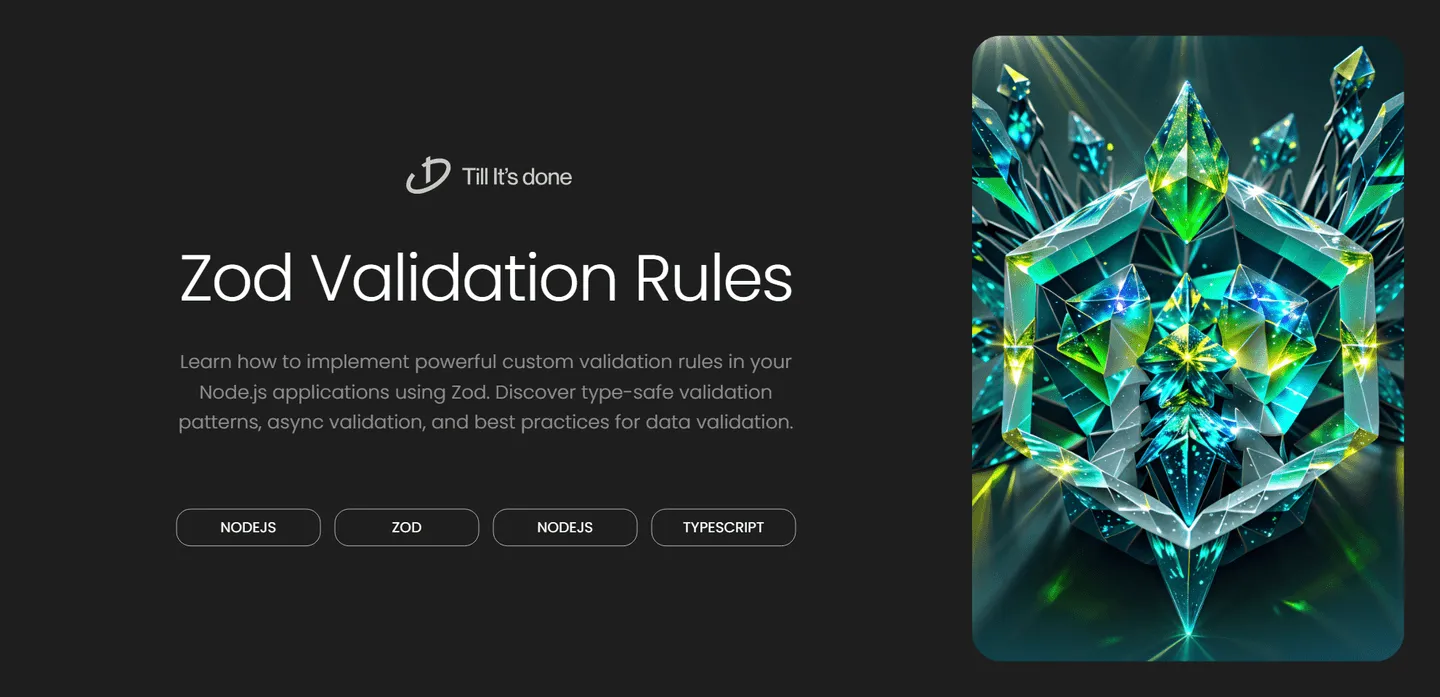
Building Custom Validation Rules with Zod in Node.js

In the ever-evolving landscape of Node.js development, data validation remains a crucial aspect of building robust applications. Enter Zod – a TypeScript-first schema validation library that’s revolutionizing how we handle data validation in our Node.js applications. Today, we’ll dive deep into creating custom validation rules with Zod and explore how it can make our validation logic both powerful and maintainable.
Understanding Zod’s Fundamentals
At its core, Zod provides an elegant way to define schemas and validate data against them. Think of it as your data’s bouncer – checking IDs and ensuring only the right data gets through to your application. What sets Zod apart is its exceptional TypeScript integration and intuitive API.

Building Your First Custom Validator
Let’s start with a practical example. Imagine you’re building an e-commerce platform where product SKUs must follow a specific pattern. Here’s how you might create a custom validator for that:
import { z } from "zod";
const ProductSchema = z.object({ sku: z.string().refine( (val) => /^PRD-[A-Z]{2}-\d{4}$/.test(val), { message: "SKU must follow pattern: PRD-XX-0000" } ), name: z.string().min(3), price: z.number().positive()});Advanced Custom Validation Techniques
As your application grows, you’ll need more sophisticated validation rules. Zod shines in these scenarios by allowing you to chain multiple refinements and create reusable validation patterns.

Async Validation Rules
Sometimes, we need to validate data against external sources, like checking if a username is unique in our database:
const UserSchema = z.object({ username: z.string().refine( async (username) => { // Simulate database check const isUnique = await checkUsernameInDatabase(username); return isUnique; }, { message: "Username already taken" } )});Best Practices and Tips
- Keep your validation rules modular and reusable
- Use meaningful error messages that guide users
- Combine multiple refinements for complex validations
- Leverage TypeScript’s type inference with Zod
- Consider performance implications for async validators
Error Handling and Custom Messages
Zod provides extensive error handling capabilities. You can customize error messages and create structured error responses that make sense for your application:
const validateData = (data: unknown) => { try { const result = ProductSchema.parse(data); return { success: true, data: result }; } catch (error) { if (error instanceof z.ZodError) { return { success: false, errors: error.errors.map(err => ({ path: err.path.join('.'), message: err.message })) }; } throw error; }};Conclusion
Custom validation with Zod brings type safety, flexibility, and maintainability to your Node.js applications. By leveraging its powerful features, you can create robust validation rules that grow with your application’s needs.

 สร้างเว็บไซต์ 1 เว็บ ต้องใช้งบเท่าไหร่? เจาะลึกทุกองค์ประกอบ website development cost อยากสร้างเว็บไซต์แต่ไม่มั่นใจในเรื่องของงบประมาณ อ่านสรุปเจาะลึกตั้งแต่ดีไซน์, ฟังก์ชัน และการดูแล พร้อมตัวอย่างงบจริงจาก Till it’s done ที่แผนชัด งบไม่บานปลายแน่นอน
สร้างเว็บไซต์ 1 เว็บ ต้องใช้งบเท่าไหร่? เจาะลึกทุกองค์ประกอบ website development cost อยากสร้างเว็บไซต์แต่ไม่มั่นใจในเรื่องของงบประมาณ อ่านสรุปเจาะลึกตั้งแต่ดีไซน์, ฟังก์ชัน และการดูแล พร้อมตัวอย่างงบจริงจาก Till it’s done ที่แผนชัด งบไม่บานปลายแน่นอน 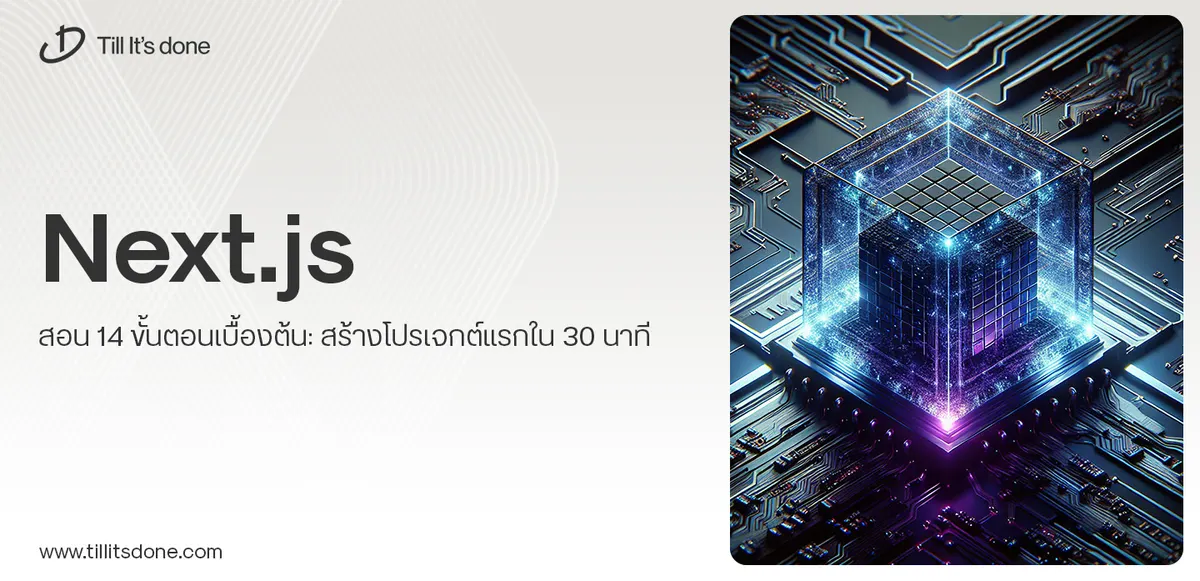 Next.js สอน 14 ขั้นตอนเบื้องต้น: สร้างโปรเจกต์แรกใน 30 นาที เริ่มต้นกับ Next.js ใน 14 ขั้นตอนเพียงแค่ 30 นาที พร้อม SSR/SSG และ API Routes ด้วยตัวอย่างโค้ดง่าย ๆ อ่านต่อเพื่อสร้างโปรเจ็กต์แรกได้ทันทีที่นี่
Next.js สอน 14 ขั้นตอนเบื้องต้น: สร้างโปรเจกต์แรกใน 30 นาที เริ่มต้นกับ Next.js ใน 14 ขั้นตอนเพียงแค่ 30 นาที พร้อม SSR/SSG และ API Routes ด้วยตัวอย่างโค้ดง่าย ๆ อ่านต่อเพื่อสร้างโปรเจ็กต์แรกได้ทันทีที่นี่  วิธีสมัคร Apple Developer Account เพื่อนำแอปขึ้น App Store ทีละขั้นตอน อยากปล่อยแอปบน App Store ระดับโลก มาอ่านคู่มือสมัคร Apple Developer Account พร้อมเคล็ดลับ TestFlight และวิธีอัปโหลดที่ง่ายในบทความเดียวนี้ได้เลย
วิธีสมัคร Apple Developer Account เพื่อนำแอปขึ้น App Store ทีละขั้นตอน อยากปล่อยแอปบน App Store ระดับโลก มาอ่านคู่มือสมัคร Apple Developer Account พร้อมเคล็ดลับ TestFlight และวิธีอัปโหลดที่ง่ายในบทความเดียวนี้ได้เลย 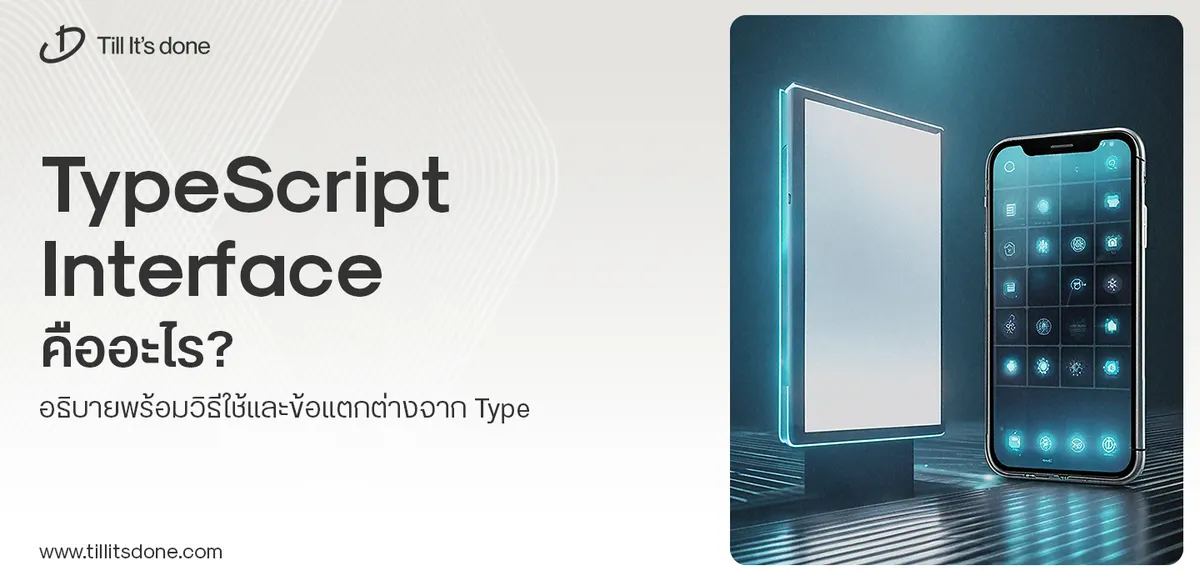 TypeScript Interface คืออะไร? อธิบายพร้อมวิธีใช้และข้อแตกต่างจาก Type เรียนรู้วิธีใช้ TypeScript Interface เพื่อสร้างโครงสร้างข้อมูลที่ปลอดภัยและเข้าใจง่าย พร้อมเปรียบเทียบข้อดีข้อแตกต่างกับ Type ที่คุณต้องรู้ ถูกรวมเอาไว้ในบทความนี้แล้ว
TypeScript Interface คืออะไร? อธิบายพร้อมวิธีใช้และข้อแตกต่างจาก Type เรียนรู้วิธีใช้ TypeScript Interface เพื่อสร้างโครงสร้างข้อมูลที่ปลอดภัยและเข้าใจง่าย พร้อมเปรียบเทียบข้อดีข้อแตกต่างกับ Type ที่คุณต้องรู้ ถูกรวมเอาไว้ในบทความนี้แล้ว 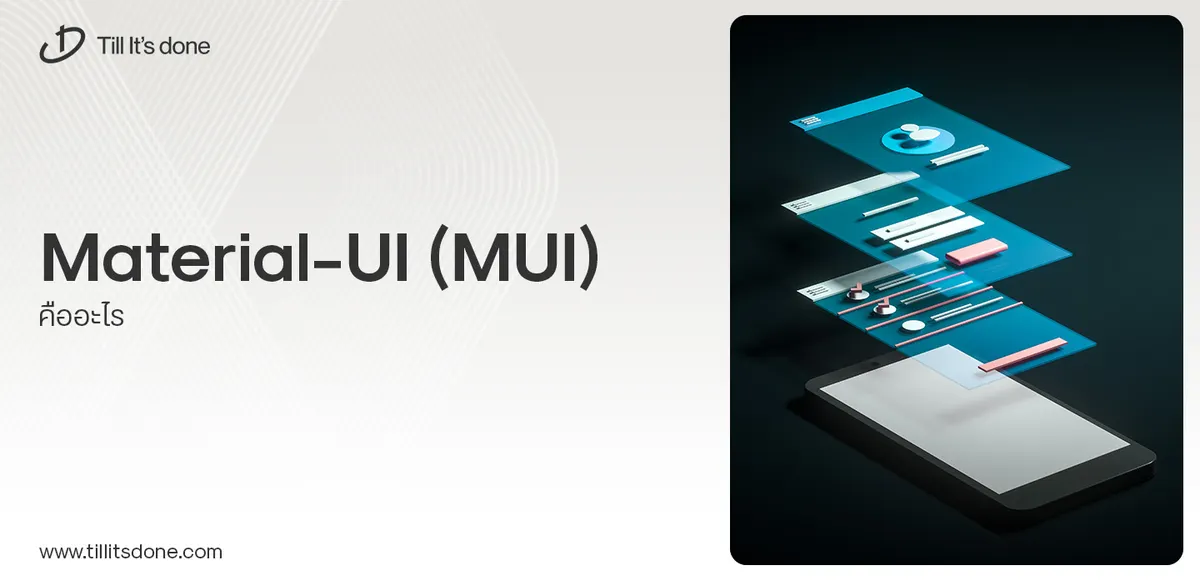 Material-UI (MUI) คืออะไร อยากสร้าง UI สวยงามและเป็นมืออาชีพในเวลาอันรวดเร็วใช่ไหม มาทำความรู้จักกับ Material-UI (MUI) ที่ช่วยให้คุณพัฒนาแอปพลิเคชันบน React ได้ง่ายและดูดีในทุกอุปกรณ์
Material-UI (MUI) คืออะไร อยากสร้าง UI สวยงามและเป็นมืออาชีพในเวลาอันรวดเร็วใช่ไหม มาทำความรู้จักกับ Material-UI (MUI) ที่ช่วยให้คุณพัฒนาแอปพลิเคชันบน React ได้ง่ายและดูดีในทุกอุปกรณ์ 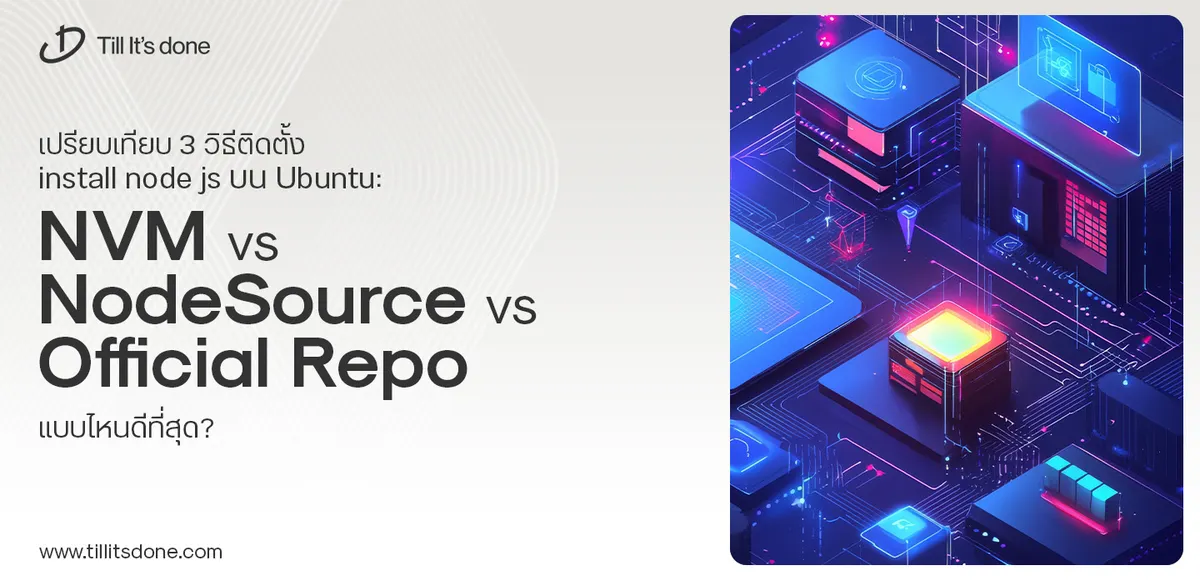 เปรียบเทียบ 3 วิธีติดตั้ง install node js บน Ubuntu: NVM vs NodeSource vs Official Repo แบบไหนดีที่สุด? เรียนรู้วิธีติดตั้ง Node.js บน Ubuntu ด้วย NVM, NodeSource หรือ Official Repo เลือกวิธีที่เหมาะกับความต้องการของคุณ พร้อมเปรียบเทียบ เพื่อการพัฒนาที่มีประสิทธิภาพ!
เปรียบเทียบ 3 วิธีติดตั้ง install node js บน Ubuntu: NVM vs NodeSource vs Official Repo แบบไหนดีที่สุด? เรียนรู้วิธีติดตั้ง Node.js บน Ubuntu ด้วย NVM, NodeSource หรือ Official Repo เลือกวิธีที่เหมาะกับความต้องการของคุณ พร้อมเปรียบเทียบ เพื่อการพัฒนาที่มีประสิทธิภาพ! Talk with CEO
We'll be right here with you every step of the way.
We'll be here, prepared to commence this promising collaboration.
Whether you're curious about features, warranties, or shopping policies, we provide comprehensive answers to assist you.


